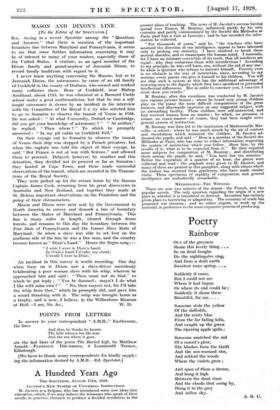MASON AND DIXON'S LINE
[To the Editor of the SPECTATOR.] Sin,—Seeing in a recent Spectator among the " Questions and Answers " that there is mention of the important boundary line between Maryland and Pennsylvania, it seems to me that some further information concerning it may be of interest to many of your readers, especially those of the United States. I venture, as an aged member of the Dixon family and grand-nephew of Jeremiah Dixon, to record family traditions with regard to it.
I never knew anything concerning the Masons, but as to Jeremiah Dixon, the astronomer, he came of an old family of Cockfield in the county of Durham, who owned and worked many collieries there. Born at Cockfield, near Bishop Auckland, about 1735, he was educated at a Barnard Castle school under a good mathematician, but that he was a self- taught astronomer is shown by an incident in his interview with the Committee of the Royal c a.ty who selected him to go to Sumatra to observe the transit of Venus in 1768. He was asked : " At what University, Oxford or Cambridge, did you get your knowledge of astronomy ? " " At neither," he replied. " Then where ? " To which he promptly answered : " In my pit cabin on Cockfield Fell."
On their voyage out to Sumatra to observe the transit of. Venus their ship was stopped by a French privateer, but when the captain was told the object of their voyage, he said " But France is not at war with Science," and allowed them to proceed. Delayed, however, by weather and this detention, they decided not to proceed so far as Sumatra ; they landed at Cape Town, and there made successful observations of the transit, which are recorded in the Transac- tions of the Royal Society.
They were picked up for the return home by the famous Captain James Cook, returning from his great discoveries in Australia and New Zealand, and together they made at St. Helena important observations on the Pendulum and the going of their chronometers.
Mason and Dixon were next sent by the Government to North America to survey and demark a line of boundary between the States of Maryland and Pennsylvania. This line is many miles in length, cleared through dense forests, and remains to this day the boundary between the Free State of Pennsylvania and the former Slave State of Maryland. So when a slave was able to set foot on the northern side of the line he was a free man, and the country became known as " Dixie's Land." Hence the Negro song
I wish I were in Dixie's Land, In Dixie's Land I'd take my stand ; I would I were in Dixie."
An incident in this survey is worth recording. One day when busy on it Dixon saw a slave-driver mercilessly belabouring a poor woman slave with his whip, whereon he approached him and said : " Thou must not do that," to which he got reply : " You be damned ; mayn't I do what I like with mine own ? " " No, thou mayest not, for I'll take thy whip from thee," which he promptly did, and gave him a sound thrashing with it. The whip was brought home as a trophy, and is now, I believe, in the Wilberforce Museum
at Hull.—I am, Sir, &c., W. D.
































 Previous page
Previous page